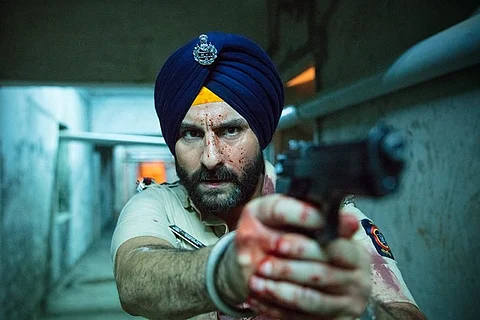

Ganesh, the remover of obstacles. The reigning deity of Mumbai, he is an imperfect being who can give us what we desperately seek. Quite like gangster Ganesh Gaitonde (Nawazzudin Siddiqui) who brings salvation to beleaguered cop Sartaj Singh (Saif Ali Khan), appearing on his phone with a prophecy of doom, and the promise that his life is going to change.
Netflix’s first Indian original series, Sacred Games, is an adaptation of the novel by acclaimed writer Vikram Chandra. Shot as a neo-noir thriller over 8 episodes, executive producer Vikramaditya Motwane and writers Varun Grover, Smita Singh and Vasant Nath have adapted the 900-page book into a gripping web of religion, politics, conspiracy and corruption that entangles you slowly but surely.
Ganesh Gaitonde, notorious gangster and leader of the G gang returns mysteriously after 15 years, and contacts a defeated Sartaj Singh, who has been sidelined by his department. Gaitonde’s phone call gives him the ray of hope he was looking for, and he jumps headlong into the rabbit hole, ironically risking his job to do it right. Along the way, he finds an ally in RAW agent Anjali Mathur (Radhika Apte), and powerful enemies who include the Home Minister, retired gang members, thumb chopping psychopaths and his fellow police officers.
While the series begins in the present day, the narrative soon branches into two distinct timelines. Anurag Kashyap directs the rise of Ganesh Gaitonde as he narrates his journey from Maharashtra’s hinterlands to becoming a mobster, while Motwane directs the present doomsday thread, taking us into the lonely world of Sartaj Singh who finds purpose in deciphering Gaitonde’s tip-off about a catastrophe in 25 days.
Though there is a clock ticking, the exposition is luxuriously paced, setting up all the major players in the game and laying out their connections without any spoilers. The pace picks up soon enough, and as the dots join and the mystery unravels, politicians, police officers and starlets struggle to keep their immunity from his dark legacy.
Gaitonde’s rise from the garbage dump to the King of Gopalmath serves as a definitive recap of how religion and politics became mutually satisfied bedfellows in India. He narrates his story in the context of landmark events like the Shah Bano case, Babri Masjid demolition, Mumbai bomb blasts and the rise of the Hindu right wing in the country, recalling how each of these events affected his life, his gang, and his ‘karmabhoomi’ Mumbai. There are even mentions of the partition and the 26/11 terror attacks, creating a timeline of intolerance and terror that continues to add new dates to its tab.
Nawazzudin Siddiqui, no stranger to playing a gangster, is reliably brilliant, surrendering completely to Gaitonde’s methods, madness and morals. Drugs, illicit liquor, extortion, murder; his life is a series of wrongdoings, yet his deep understanding of religion’s toxicity is surprisingly wise.
“Going god’s way clears all the pathways,” he quips, summarizing how religious fault lines are created and nurtured by those who build careers on conflict. Siddiqui humanizes the man, telling his story with sensitivity, humour and no judgement.
Complementing him every step of the way is Saif Ali Khan in fabulous form after a long time. Anxious, lonely, bitter but still sincere, Sartaj Singh is perhaps the most complex character Khan has portrayed in his career. One of the only Sikhs in the Mumbai police, Sartaj is not only in religious minority, but also solitary in his attempts at doing his job with honesty. Khan’s eyes are tired, his body seems stuffed into and suffocated in the police uniform and his silences are as heart-wrenching as his screaming meltdown in his dank apartment.
Sartaj’s only support is his right-hand man Constable Katekar, played brilliantly by Jitendra Joshi, who picks up his calls and lifts his spirits at all odd hours. There is little light in his house and life, literal or otherwise, and while Motwane wants us to root for him, he never tries to glorify or ennoble him.
Khan and Siddiqui are supported by a perfectly cast group of powerful actors who get into the skin of their characters effortlessly. Particularly impressive are Neeraj Kabi as Khan’s morally defunct boss Parulkar, Shalini Vatsa as Kanta Bai, Gaitonde’s voice of reason, Kubra Sait as his first love Kuckoo, Rajshri Deshpande as Subhadra and Jatin Sarna and Gaitonde’s sidekick Bunty. The series gives each of the supporting characters well-defined arcs and motives that organically find common ground or clash violently to take the story forward.
Special credit must be given to the cinematographers and art direction unit who convincingly recreate the journey of Bombay to Mumbai, choosing real largely outdoor locations over stereotypical beauty shots that are authentic to a story that exposes the fragility and fetid nature of the city; the garbage from which castles rise, as Gaitonde says. Crisply edited by Aarti Bajaj and with a haunting background score, Sacred Games is a brilliant first production to emerge from India, proving that we are ready to take our content to a global scale.
While it’s essentially a cat and mouse thriller, Sacred Games is also a poignant commentary on the equalizing power of hatred, perhaps the only emotion that is truly “secular” in India. It questions why we associate ourselves so deeply with our religious identity, why we place allegiance to an invisible god over our intuitive humanity, and why inspite of so many years of betrayal and bloodshed we just can’t seem to kick our addiction to our God, who as a character says, got sick of us long ago.